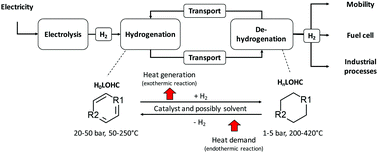Liquid organic hydrogen carriers (LOHCs) – techno-economic analysis of LOHCs in a defined process chain†
Abstract
Long-distance transport and long-term storage of hydrogen can be realized with Liquid Organic Hydrogen Carriers (LOHC) based on a two-step cycle: (1) loading of hydrogen (hydrogenation) into the LOHC molecule (i.e., hydrogen is covalently bound to the LOHC) and (2) unloading of hydrogen (dehydrogenation) after transport and storage. Since the (optimal) LOHC is liquid at ambient conditions and shows similar properties to crude oil based liquids (e.g. diesel, and gasoline), handling and storage is realized by well-known processes; thus stepwise adaptation of the existing crude oil based infrastructure is basically possible. Against this background, a defined process chain for intercontinental ship transport of hydrogen (5000 km) is simulated with various LOHCs. The respective results are evaluated and assessed related to their technological and economic performance. Additionally, they are compared to a pipeline-based provision chain based on compressed hydrogen (CGH2). Among others, the results show that methanol is the cheapest LOHC option for storage and transportation followed by dibenzyltoluene and toluene. For a storage time of 60 days they show economic advantages compared to compressed hydrogen (CGH2) under the defined assumptions; thus these LOHC options are especially advantageous for long-term storage/long distance transport applications. The energetic efficiency of the systems mainly depends on the source of the dehydrogenation heat. Two options, dehydrogenation driven by hydrogen burning vs. dehydrogenation driven by waste heat, have been evaluated in this study. Systems that run on waste heat perform much better in terms of efficiency. Overall, LOHCs can provide technologically efficient and economic promising storage and transport within a sustainable hydrogen economy.



 Please wait while we load your content...
Please wait while we load your content...